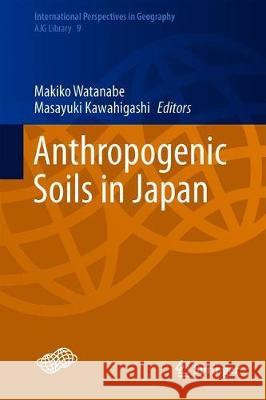Anthropogenic Soils in Japan » książka



Anthropogenic Soils in Japan
ISBN-13: 9789811317521 / Angielski / Twarda / 2018 / 186 str.
Anthropogenic Soils in Japan
ISBN-13: 9789811317521 / Angielski / Twarda / 2018 / 186 str.
(netto: 460,04 VAT: 5%)
Najniższa cena z 30 dni: 462,63
ok. 16-18 dni roboczych.
Darmowa dostawa!
This book enhances the discussion of anthropized soils with photographs of soil profiles and provides general information about soils in Japan, using data on their physical and chemical properties.
Masayuki Kawahigashi is associate professor of environmental geography in the Graduate School of Urban Environmental Sciences, Tokyo Metropolitan University, Japan. He is a delegate of the Japanese Society of Soil Sciences and Plant Nutrition, a consilor of Japanese Society of Pedology, a subject editor of Soil Science and Plant Nutrition (2013–2015, 2017–2018), and a visiting associate professor at the Faculty of Earth Sciences of Nicolaus Copernicus University in Toruń, Poland (2018). He was a visiting scientist at the University of Bayreuth (2002) and at the Martin Luther University of Halle-Wittenberg, supported by the Alexander von Humboldt Foundation (2003–2004). He focuses on dynamics of elements in ecosystems of various climatic zones from boreal to tropical regions, also addressing soil and water in agricultural and urban systems to understand anthropogenic impacts on ecosystems. Soils in anthropized environments are his latest challenges in researching soils from several different scientific points of view.
This book enhances the discussion of anthropized soils with photographs of soil profiles and provides general information about soils in Japan, using data on their physical and chemical properties. Soils targeted in this book have wide spectra in anthropized influences from lesser effects such as agricultural improvements to drastic changes caused by infrastructure construction. These include soils sealed by technic hard materials, on ski slopes, on river embankments and coastal berms, in historical urban parks, on man-made islands in Tokyo Bay, in reclaimed lands, in greenhouse fields, and those filling in swamplands. These examples supported with data can be a bridge between agriculture and civil engineering to understand how anthropogenic activities influence soils. Because anthropogenic impacts have increased during the past decades along with concentrations of populations into cities, processes in soils must be addressed from the point of view of diverse land-use purposes.
1997-2026 DolnySlask.com Agencja Internetowa
KrainaKsiazek.PL - Księgarnia Internetowa









